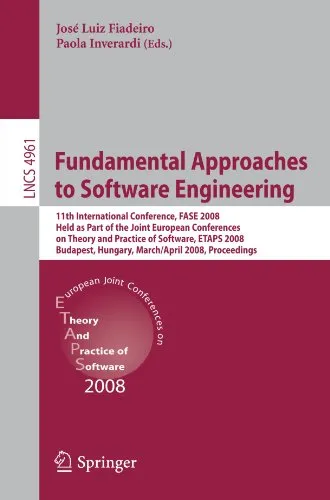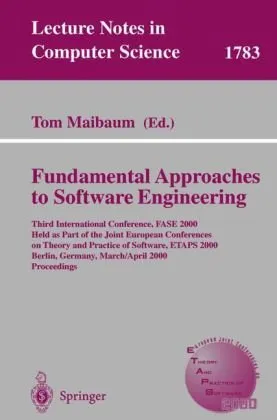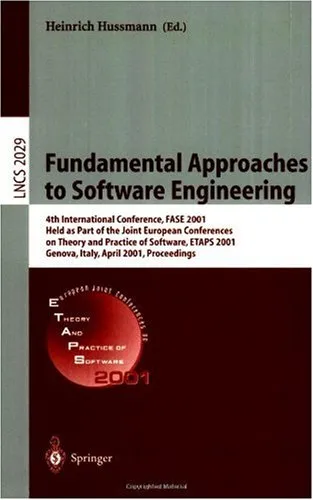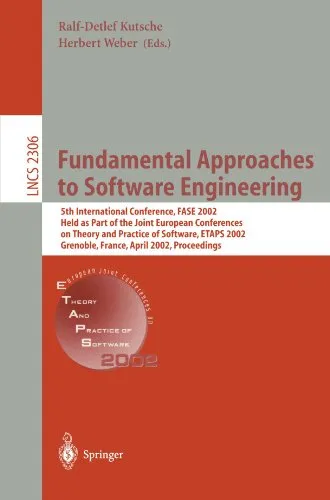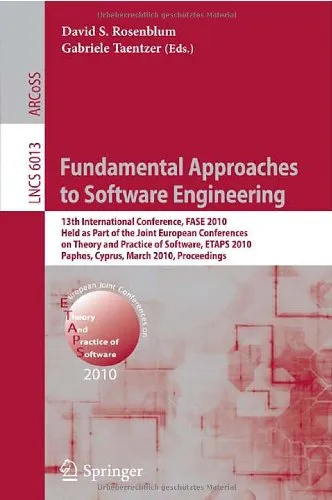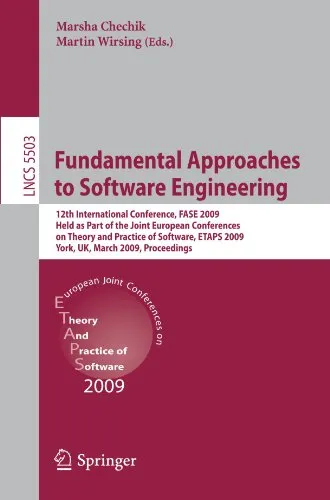Fundamental Approaches to Software Engineering: 11th International Conference, FASE 2008, Held as Part of the Joint European Conferences on Theory and Practice of Software, ETAPS 2008, Budapest, Hungary, March 29-April 6, 2008. Proceedings
4.0
Reviews from our users

You Can Ask your questions from this book's AI after Login
Each download or ask from book AI costs 2 points. To earn more free points, please visit the Points Guide Page and complete some valuable actions.Related Refrences:
Introduction
The book "Fundamental Approaches to Software Engineering: 11th International Conference, FASE 2008, Held as Part of the Joint European Conferences on Theory and Practice of Software, ETAPS 2008, Budapest, Hungary, March 29-April 6, 2008. Proceedings" represents a significant contribution to the field of software engineering by exploring its theoretical foundation and practical applications. Edited by José Luiz Fiadeiro and Paola Inverardi, and authored by several distinguished contributors, this publication presents the proceedings of FASE 2008, an internationally recognized conference that serves as a nexus for research and innovation in the discipline.
This book encapsulates research presented during the conference, covering a wide spectrum of topics, including modeling, analysis, verification, and synthesis of software systems, as well as advanced approaches to software development methodologies. Additionally, the book emphasizes the importance of integrating formal methods with practical techniques to address the evolving challenges in software engineering. By combining research expertise, practical case studies, and innovative solutions, the book offers invaluable insights to academia, industry professionals, and students alike.
Detailed Summary of the Book
The proceedings begin with an overview of cutting-edge approaches that define the future of software engineering. Each paper featured in the book is a testament to rigorous research and the practical impact of software development frameworks and techniques. The core ideas revolve around enhancing the quality of software systems, improving automation in development pipelines, and ensuring scalability across diverse applications.
One of the key themes of the book focuses on formal methods such as model checking, theorem proving, and other verification techniques that ensure software correctness and reliability. At the same time, the discussions in the book extend these theoretical concepts into practical realms, such as component-based development, service-oriented architectures, and domain-specific languages. These contributions emphasize how theory and practice come together to bridge the gap in contemporary software engineering challenges.
The conference proceedings also feature innovative applications of emerging trends like self-adaptive systems, software product lines, and dynamic software synthesis. The intentional blend of practical applications with theoretical rigor makes the book stand out as a key resource for understanding and improving current software engineering paradigms. Each chapter highlights a specific aspect of engineering, offering detailed insights, case studies, and discussions to further stimulate the future of software architecture design and implementation.
Key Takeaways
- Comprehensive insights into formal methods for verification and validation of software systems.
- Discussions of practical implementations of advanced methodologies such as software product lines and service-oriented architectures.
- A focus on self-adaptive systems and dynamic software synthesis to streamline modern development pipelines.
- Innovative research that connects theoretical knowledge with practical software engineering challenges.
- Critical understanding of how software development methodologies can evolve to meet real-world requirements.
Famous Quotes from the Book
"The future of software engineering lies in our ability to balance rigor with practicality, innovation with reliability, and creativity with structure."
"By bridging theoretical advancements with practical applications, we not only address current needs but also lay the foundation for resilient software systems of tomorrow."
Why This Book Matters
This book is a cornerstone for understanding the advancements and challenges in modern software engineering. It provides a detailed examination of both theoretical and practical approaches, making it essential reading for a variety of audiences including researchers, developers, and educators. Its emphasis on formal methods ensures the academic rigor needed to drive innovations, while its practical applicability creates tangible benefits for professionals in the field.
Moreover, the topics it covers remain highly relevant in today's rapidly changing software landscape. Concepts such as service-oriented architectures, component-based design, and adaptive systems continue to dominate discussions on effective software development strategies. This book doesn’t merely reflect on the field's state at the time of its writing but serves as a timeless resource for navigating the ongoing evolution of software engineering.
In a discipline that requires constant learning and adaptation, this book supports the development of a strong foundational understanding while also encouraging thought leadership and innovation. It bridges the often distant worlds of academia and industry, fostering collaboration and knowledge exchange, which are the lifeblood of software engineering research and practice.
Free Direct Download
You Can Download this book after Login
Accessing books through legal platforms and public libraries not only supports the rights of authors and publishers but also contributes to the sustainability of reading culture. Before downloading, please take a moment to consider these options.
Find this book on other platforms:
WorldCat helps you find books in libraries worldwide.
See ratings, reviews, and discussions on Goodreads.
Find and buy rare or used books on AbeBooks.
1208
بازدید4.0
امتیاز0
نظر98%
رضایتReviews:
4.0
Based on 0 users review
Questions & Answers
Ask questions about this book or help others by answering
No questions yet. Be the first to ask!
